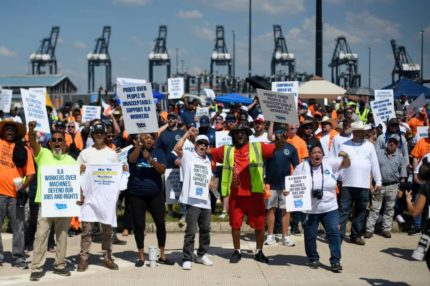The International Longshoremen’s Association (ILA) of US, representing tens of thousands of dockworkers, has announced a temporary suspension of its strike across major U.S. ports. The strike, which began on Tuesday, affected 14 critical ports along the East and Gulf coasts, halting container traffic from Maine to Texas. After three days of disruption, the ILA reached a tentative agreement on wage increases and plans to resume work on Friday, with negotiations set to continue on other issues until January 15.
The strike, marking the first major port stoppage in nearly 50 years, raised concerns about potential economic disruptions, especially as the holiday shopping season approaches and the 2024 presidential election looms. In a joint statement, the ILA and the United States Maritime Alliance (U.SMX), the employer group, confirmed that all current job actions would cease and operations would resume. However, the agreement is only provisional, with further discussions scheduled for early 2024 to address unresolved matters, including the contentious issue of automation in port operations.
Historic Wage Agreement Reached Amidst Strike in U.S maritime industry
A significant achievement of the strike has been the tentative agreement to raise dockworkers’ wages by 62% over the next six years. This concession marks a substantial gain for the union, which initially called for a 77% wage increase. While U.SMX had previously offered close to a 50% raise, the final agreement is a notable improvement for workers. According to Patrick L. Anderson, CEO of Anderson Economic Group, the ILA strike will be remembered as “one of the most lucrative 3 days in labor-management history” due to the scale of the wage increases secured.
Despite this success, negotiations between the union and port operators are far from over. Key issues, particularly related to automation and technological upgrades, remain unresolved. Automation, which the union sees as a threat to job security, is expected to dominate upcoming negotiations in January. The dockworkers’ previous contract, which expired earlier this week, had provided hourly wages ranging from $20 to $39, alongside other benefits. The union is now seeking further wage enhancements and protections against potential automation-related job losses.
Economic Impact and Response to the Strike
The temporary strike prompted widespread concern among business owners, with major sectors bracing for the potential economic fallout. Ports affected by the strike, including those in New York, Georgia, and Texas, handle over a third of the nation’s imports and exports. The suspension of operations at these critical hubs raised fears of supply chain disruptions in U.S , particularly during the peak holiday season. Matthew Shay, president of the National Retail Federation, welcomed the suspension, stating, “The decision to end the current strike and allow the East and Gulf coast ports to reopen is good news for the nation’s economy.”
Many businesses had prepared for a prolonged shutdown by increasing inventory levels. Consumers, too, had begun to stockpile essential goods like baby formula and toilet paper in anticipation of shortages. Despite the short duration of the strike, the threat of a prolonged work stoppage could have severely impacted global trade, disrupted supply chains, and slowed the U.S. economy. The dockworkers’ strike thus served as a stark reminder of the importance of these ports to the overall economic stability of the country.
Political Reactions and Broader Implications
President Joe Biden praised the tentative agreement as a critical step towards securing a strong contract for the dockworkers. In a statement, he commended both the ILA and the USMX for their efforts, highlighting the sacrifices made by dockworkers, particularly during the COVID-19 pandemic. Biden emphasized the importance of keeping ports operational, especially in light of recent natural disasters such as Hurricane Helene, which caused widespread devastation in the U.S. Southeast, leaving over 200 dead. “Ensuring the availability of critical supplies is essential for those affected,” Biden noted.
Looking ahead, the suspension of the strike until January offers a temporary reprieve, but the possibility of future disruptions remains. The ongoing negotiations between the union and port operators will be crucial, as unresolved issues like automation continue to loom large. With the 2024 presidential election on the horizon, the situation may become a significant talking point in political discussions, particularly regarding labor rights and the future of the U.S. economy. The dockworkers’ demands, and the outcome of the negotiations, could have lasting effects on labor policies and port operations across the country.














